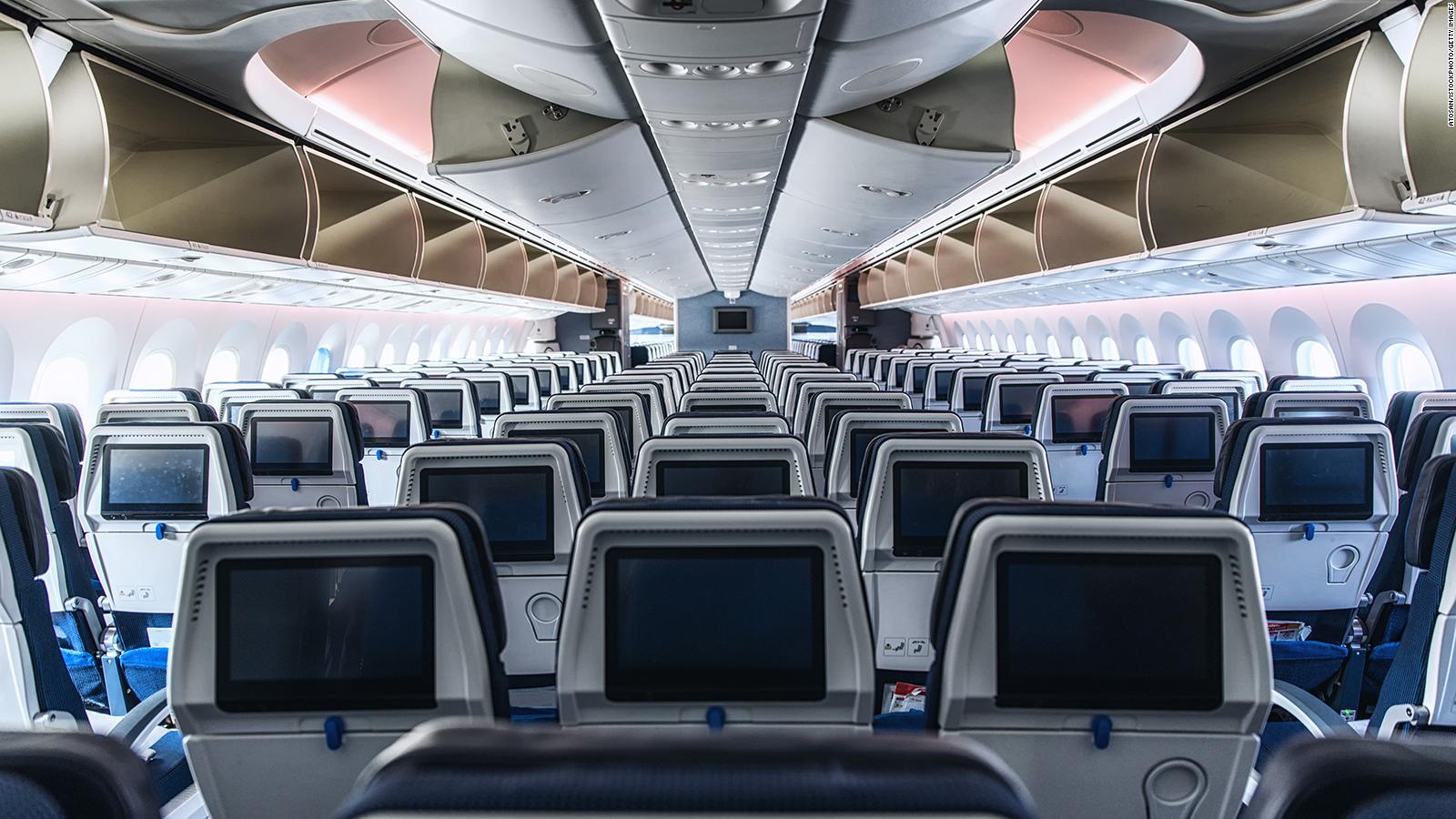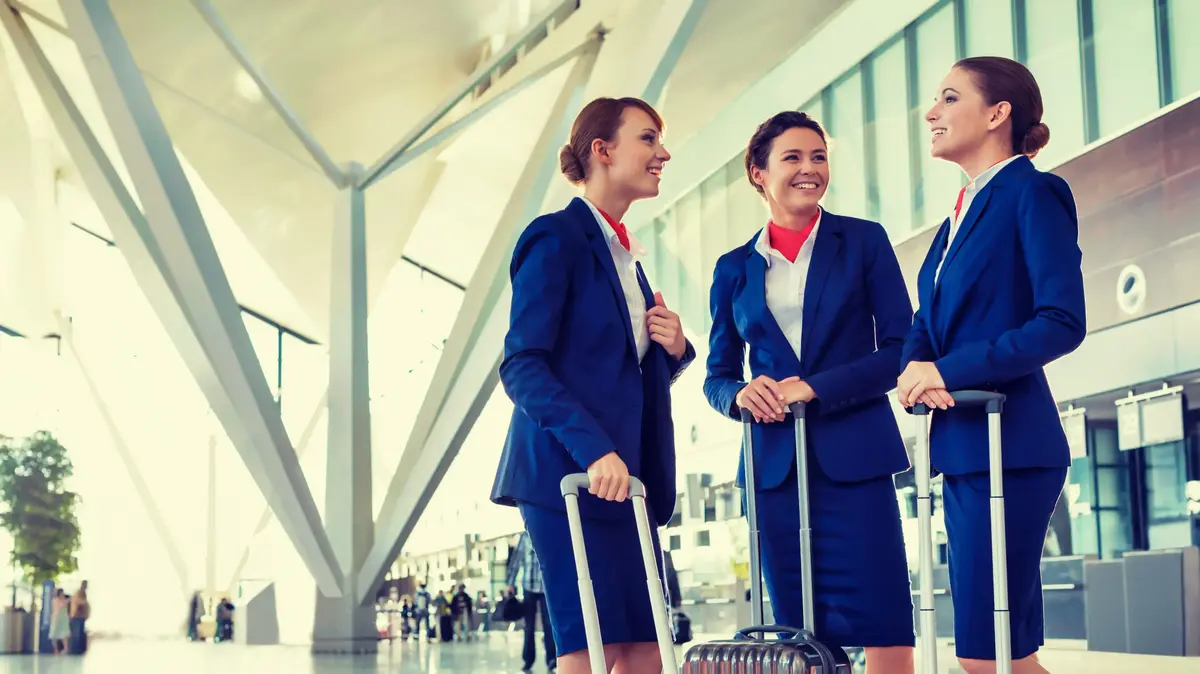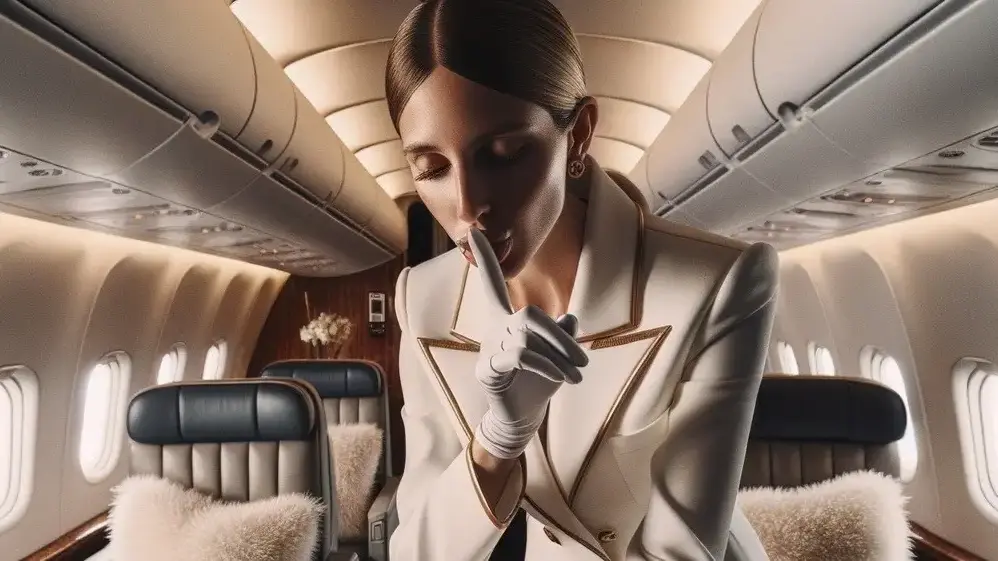Full airports for Thanksgiving 1:16
(CNN) --
It seems like the summer travel chaos has just subsided, but the Christmas travel season is right around the corner.
More than four million Americans prepare to fly to celebrate Thanksgiving in the US, which marks the start of one of the busiest periods of the year in terms of travel.
Navigating the world of airports and airplanes this holiday season can be stressful, but if there's anyone who knows holiday travel, it's flight attendants.
Intrigued by her tips and tricks, CNN Travel spoke to two veteran flight attendants, Kris Major from the UK and Allie Malis from the US, to get their thoughts on some of the key travel issues.
What is the best time to fly?
Some destinations offer several flights throughout the day, so is it better to go early or leave it for later?
Malis votes to ride the first flight in the morning when she makes personal trips.
"That's my trick," he says.
"I don't know if I should warn everyone. Or they're going to cut me off all the flights in the morning."
advertising
Malis's logic is that the weather is less likely to disrupt early-morning flights, even if there were delays the day before, the system would usually have been reset overnight.
When it comes to vacation travel, Malis, who is also a government affairs representative for the Association of Professional Flight Attendants, the union that represents American Airlines crew, suggests leaving some time off if you can.
For example, flying the day before Christmas Eve, instead of the 24th, gives you a bit of leeway.
What can I do if my flight is delayed?
Travelers at Denver International Airport on November 22, 2022. 4.5 million Americans will be traveling by plane over the Thanksgiving holiday.
Credit: Scott Olson/Getty Images
Delays happen and Malis reminds passengers that flight attendants and passengers are "on the same team."
For his part, Major, who has worked on long and short hauls throughout his career, and who also chairs the Joint Committee on Air Crew of the European Federation of Transport Workers, which represents European flight attendants and pilots , share this opinion.
"If we can't go, we can't go," he says.
"We will do everything in our power to go, because it interests us."
And contrary to what some passengers might think, flight attendants do not withhold information from passengers.
"It doesn't make sense," Major says.
So if you're sitting on a delayed flight, stressing out about missed connections, don't hesitate to ask your flight attendant for as much information as possible.
Major says he'll direct passengers to the right counter to rebook a flight, letting them know "the questions to ask."
How to beat jet lag?
If you're going to be crossing time zones, Major is a big supporter of taking a nap on arrival, with one caveat: keep it short and stay up until nightfall.
"Don't lie down and sleep until the end of the day, because you stay on your own schedule and don't help your own body clock reset your circadian rhythm," he says.
That being said, sometimes flight attendants are only at a destination for 24 hours.
If that's the case, Major says they typically stay in their home time zone.
And Malis believes that some travelers may find it useful while on vacation.
"You might only be traveling for a few days, and you'll be jet-lagged adjusting to the new time zone and you'll also be jet-lagged coming back a few days later, so staying in your home time zone can be helpful," he says.
Malis also stresses the importance of "hydrating, eating nutritious food and exercising."
And "be in tune with your body as best you can."
"Really the only way I've gotten this far in my career as a flight attendant is by prioritizing rest," he says.
"Being tired can affect everything, the holidays can be stressful so give yourself the best chance to get adequate rest to enjoy the holidays in the most positive and festive way."
A Brit Came Uninvited To Their Thanksgiving Dinner And Now They've Been Married For 20 Years
Do you ever upgrade passengers on board?
It's the scenario most passengers dream of, being moved from their cramped seat in the economy cabin to something more luxurious.
Malis explains that upgrades happen on the ground, not on board, but there are exceptions and sometimes a ground agent advises flight attendants that certain travelers may receive an upgrade.
"But there is a list," he says.
"And there is a method behind it, the way the list is ordered and prioritized."
Sometimes flight attendants also move passengers so that families can sit together, or to resolve a double seating situation.
But once the flight is in the air, passengers only switch seats in exceptional situations, such as if one passenger is making another passenger uncomfortable.
Can passengers change their seats?
"If one passenger wants to ask another, we can't stop them," says Major, who says that in his experience, travelers are often happy to change seats to allow parents to sit with their children.
Flight attendants support these types of changes, but try not to interfere unless there are problems.
"We are interested in having people together, because we don't want people to be separated," he says.
Malis says she also works hard to make sure parents and children are together, but suggests that these situations be resolved before boarding, if possible.
"We are under a lot of pressure asking passengers for favors to change seats and it is a very time-sensitive part of the flight when we are boarding," he says.
Seat changes can also be controversial if you move to an area of the plane where other passengers have paid more to sit there.
"From a practical point of view, I get it... If you have three people crammed into a seat and an empty row up there, shouldn't everyone be able to split up? It's nice when the flight allows it," says Malis .
"But also respect that there are people who have paid extra to be there and that someone hasn't and that's unfair."
Malis also thinks it's a bit ironic that emergency exit rows are sometimes marketed as premium seats, complete with a free drink.
"People who are asked to be willing and able to help in an emergency are maybe more likely to have a couple of drinks if they're sitting there. But that's the way it is, that's how those seats are marketed," Malis says. .
"Luckily, we don't have a lot of emergency evacuations."
Who is entitled to the middle armrest?
Major jokingly describes the fight for the middle armrest as a "brutal fight", but is firmly in favor of the position that the person in the middle should take it.
Malis agrees: "It's not written anywhere that I know of, but I think the unspoken courtesy is that the person in the middle seat, in the middle seat, gets the armrest."
An airline launched a raffle for more passengers to reserve the middle seat
Should window blinds remain closed or open?
Some people want them up, others want them down.
Major says window blinds can be a contentious topic, especially on long-haul flights, but the answer is usually pretty straightforward.
"If it's a night flight, close them," Major says.
"Just one person opening the blinds, the light comes in and keeps people awake and it can really have an impact on people. But you have to understand: people want to look down. If you're flying over the Himalayas, you want to throw Take a look at Mount Everest. Why not?"
The blinds also have to be open on arrival due to security regulations, much to the annoyance of some sleepy passengers.
Major says that if the travelers resist, he'll try to explain that the crew needs to be able to see out to adjust to the light in case there's a problem.
"I think people are much more accepting of an explanation than an order," he says.
"An explanation...gives some mutual respect."
How can they stand being on their feet all day?
Working as a flight attendant involves walking and standing a lot.
Credit: Matt Hunt/SOPA Images/LightRocket/Getty Images
Working as a flight attendant is a physically demanding job.
On long-haul or short-haul flights, you can be on your feet for hours.
"I wear insoles in my shoes," Major says, adding that it's more difficult for her colleagues, who sometimes have to wear heels.
Those who can choose the most comfortable shoes possible, says Major, who says Doc Martens are a popular choice.
Malis says high heels "definitely put extra stress on our feet," but some flight attendants change their shoes on board for something more comfortable.
"It's a stepping job. I think standing is almost as tiring as walking, it can be hard on the lower back," he says.
20 Amazing Facts About The A380 Superjumbo, The Largest Passenger Plane Ever Produced
What do they do in the dead times of the flights?
Long-haul flights include structured rest periods for cabin crew.
Flight attendants retire to a separate area of the aircraft during this downtime.
Facilities vary by airline, route, and aircraft.
"Some have beds, others are just comfortable seats in remote parts of the plane," Major says.
"The facilities they offer will depend on the rest time you should have, and based on that you can work."
Still, it's not always easy to sleep on a plane, even if you're a flight attendant and need to recharge before heading back to work.
"I know crew members who don't, and they read a book or watch a movie on their iPad or something," Major says.
Major says that flight attendants who work for low-cost airlines sometimes have more downtime on board, since they don't serve much food and drink.
Cabin crew can try to make the most of those breaks.
"Many people take higher education courses, take advantage of downtime in hotels and places like that, and even on flights, to do the job," he explains.
Malis says she rarely has time to herself on her domestic flights to the United States.
If she has it, she eats a quick snack to recharge.
Do they eat and drink the same as the passengers?
Malis and Major state that flight attendants can eat and drink airline culinary offerings, but they can choose not to.
"Airplane options aren't always the foods that are going to keep me most alert," says Malis, who says she usually packs light snacks like hummus, apples and popcorn.
"I will say that I drink a lot of coffee on the plane, but I usually bring my own, at least one on the way to work or at the airport that is a little stronger, and I sip it all morning."
Why we love airplane food
Major says to avoid foods that can make you feel bloated.
The main objective of him is to drink a lot of water on board.
"You'll always find the crew have a bottle of water and a hot drink somewhere, they'll have a tea or coffee."
Major says some attendants also bring their own food on board, often due to dietary requirements, but his airline doesn't allow crew members to heat food from home in the onboard ovens.
Malis says his airline theoretically allows flight attendants to heat food brought from home, but you have to bring the right pan and ovens can be unpredictable when it comes to getting it to the right temperature.
On flights during the festive seasons, Malis says some crew members can get creative, bringing food to add to the festive atmosphere and "to cheer the crew up if they're missing out on spending the day with their family."
"There are some very nifty little things that flight attendants can do in the kitchen," he adds.
"But for the most part, there's not a lot of time for it. Most flight attendants try to find any spare moment to grab a bite to eat and keep going on some of these marathon days."
How do you help nervous passengers?
Flying can be a nerve-wracking experience, especially on flights with heavy traffic.
Pictured: Travelers waiting at Newark Liberty International Airport on November 22, 2022. Credit: Spencer Platt/Getty Images
For some passengers, it is the fact that they are not in control.
Other travelers hate the unidentified noises that soundtrack the flight.
"When I find someone who has a fear of flying, I try to find out what's behind it," says Major.
"If you can talk to people and find out why they're afraid, then you can alleviate their fears, because the chances of something mechanical creating a situation where the plane crashes...are more than remote."
Some people find it helpful to learn more about mechanics and logistics.
Other passengers just need to be distracted, and talking to the flight attendants can help.
"The crew, that depends on their abilities to figure out what that person needs to get through the flight," Major says.
If Major talks to an anxious passenger before the plane takes off, there's another issue at play as well: Flight attendants want to prevent someone from deciding to get off the plane at the last minute, which could delay the flight and cause the plane to miss. your takeoff space.
Major and his team have to decide as soon as possible if the passenger can fly that day.
"That, again, comes down to the skills of the crew," says Major, who will always strive to remain calm in such moments.
"I don't want passengers to think that my main concern is, 'Are you going to delay me closing the doors and putting this on the air?'
Malis advises anxious passengers to let the crew know.
If an attendant knows that a passenger is nervous, he will try to monitor him throughout the flight.
He recommends breathing techniques, and also advises carrying a book that will suck you in or lose yourself in a TV show or movie.
Major also advises bringing an iPad, coloring books or toys to entertain children and keep them as calm as possible during the flight.
Are you worried about turbulence?
When working on a flight, Malis sees turbulence as "more of a nuisance and inconvenience."
"But it's kind of funny, when I'm a passenger and I hit turbulence, I feel like every other passenger, which doesn't make any sense. I'm always like, 'What was that bump? Is everything okay?'
It's a reminder that a rough flight isn't fun for anyone...even if it's usually nothing to worry about.
What to do in a medical situation on board?
Major says how the crew approaches a medical situation on board depends on several factors, including the nature of the situation and crew preferences.
You generally don't go for the classic "is there a doctor on board?" call.
"In the UK, most crews don't call for a doctor, they do it themselves. We don't want someone who doesn't know our environment to intervene."
Flight attendants have medical supplies on board in case of an emergency, although they can only administer certain medications under the direction of a radio call to the ground.
"They can tell us what we need to know anyway," says Major, who says she has never helped with a birth on board, but has come close to doing so.
"If someone has a cardiac arrest, we have the defibrillator, we can do it. If a doctor wants to help us, they can do it, but it depends on the case."
Malis says that on his US-based flights, cabin crew also make calls to doctors on the ground in the event of a medical emergency.
But unlike Major, she says that "having a doctor or nurse on the flight is definitely preferable or helpful."
"Personally, I would prefer to call a medic on a plane. I think they are obviously the best suited for those kinds of circumstances. But we have resources on the ground and our own basic training that covers a lot of things."
What is the situation like when there is a celebrity on the flight?
Everyone has to find a way to get from point A to point B, even the famous.
In fact, Major says that on almost every transatlantic flight there is likely to be someone at least half famous among the hundreds of passengers.
Cabin crew usually don't get any warning that a celebrity is going to be on board;
they usually only realize it when they see his name on the passenger list.
But there are some exceptions.
"Sometimes they tell you that there is a VIP on board, who is usually from the royal family," says Major.
And yes, some celebrities have a reputation for being rude, and that reputation extends among flight attendants.
Similarly, some celebrities are known among cabin crew for being friendly and charming.
Malis says fellow passengers often have no idea they're hobnobbing with celebrities.
"If you're sitting in the back of the plane, there's a good chance there's a celebrity in first class that you haven't heard about," he says.
Do you use codes to refer to passengers?
Major says that when he first started flying two decades ago, flight attendants sometimes used the code "BOB," aka "best on board," to refer to the passenger they considered the most handsome.
"It's just a bit of fun," he says, adding that it's not so common now.
"We're talking about years ago."
What do you think when the passengers clap when the plane lands?
Major suggests that it is a regional thing and that it is more common on European flights.
"Italians do it on all flights, always. Sometimes after bad turbulence they do it. People are relieved when they get there because they don't really understand turbulence," he says.
Malis says that in the United States, passengers typically applaud only after a very bumpy flight.
"Supongo que la gente se sorprende de que el avión haya aterrizado, no estoy seguro. La mayoría de los aviones aterrizan", dice. "Personalmente, creo que es un poco cursi. Creo que muchos auxiliares de vuelo estarían de acuerdo conmigo en eso".
¿Qué cosas extrañas deja la gente en la cabina?
Es mejor no preguntar.
"Todo lo que puedas imaginar, lo habremos encontrado", dice Major.
- Confesiones de una auxiliar de vuelo de la década de 1980
¿Se han hecho amigos de algún pasajero?
En una ocasión, Major llevó en su auto a un pasajero que se había quedado varado y aún hoy siguen conectados en las redes sociales.
En cuanto a Malis, dice que el hecho de que los auxiliares de vuelo conecten o no con los pasajeros depende de su nivel de comodidad personal, y los límites deben respetarse siempre.
"Ha habido casos de pasajeros que han acosado a los auxiliares de vuelo y cosas así. Por eso es importante que mantengamos una especie de línea profesional", afirma.
Pero una vez acabó volando con su entrenador de baloncesto de quinto grado, por pura coincidencia, lo que fue divertido.
Y tanto Malis como Major conocen historias de auxiliares de vuelo que se han casado con pasajeros.
¿Pueden aceptar regalos de los pasajeros?
Major dice que los auxiliares de vuelo solo pueden aceptar paquetes cerrados, debido a las implicaciones de seguridad.
Malis dice que la tripulación aprecia de verdad las muestras de agradecimiento.
"Nos alegra mucho que la gente tenga la delicadeza de reconocernos así", comenta.
"Recibimos mucho chocolate. Las tarjetas de regalo de Starbucks son geniales".
Malis isn't sure about the current policy, but she remembers flight attendants were once told to refuse cash three times, but could accept it on the fourth try.
While it's nice for the crew to receive holiday gifts, Malis says even a simple smile makes a world of difference and can change the mood on board.
"Actually, you'd be surprised how many people just ignore you, when you say hello, and don't even look at you or say anything," he says.
"I don't know if anyone's first choice is to fly on vacation. But we're all in this together."
travel recommendations











